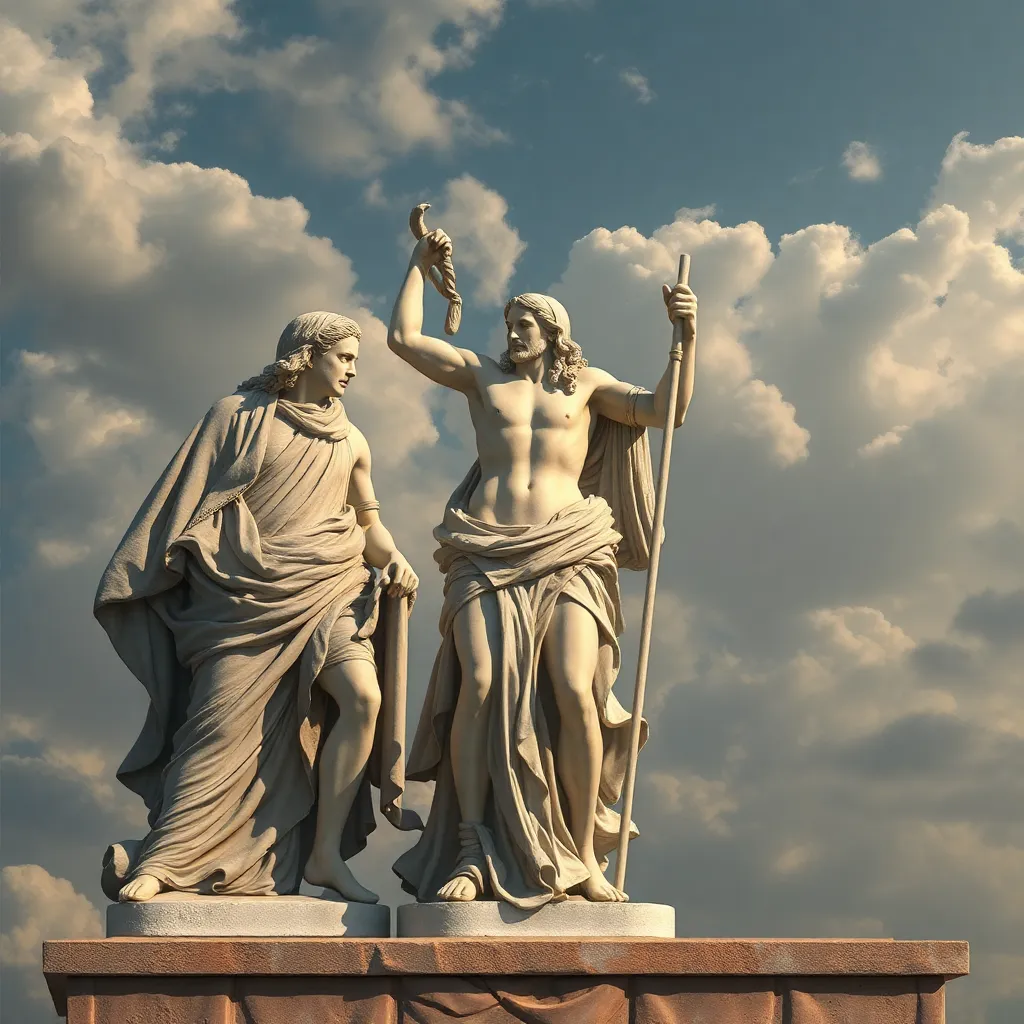The Myths of Dionysus: A Study of Transformation and Identity
I. Introduction
Dionysus, the Greek god of wine, festivity, and ecstasy, occupies a unique position in Greek mythology. Unlike most gods who embody a single aspect of existence, Dionysus represents a duality that encompasses both joy and chaos. His myths often explore themes of transformation and identity, reflecting the complexities of human nature and social dynamics.
This article aims to delve into the multifaceted nature of Dionysus, examining how his stories illustrate the themes of transformation and personal identity. By analyzing the historical context, dual nature, and enduring influence of Dionysian myths, we seek to uncover the relevance of these ancient tales in contemporary society.
II. Historical Context of Dionysus
The origins of the Dionysian cult can be traced back to ancient agrarian societies, where the god was initially associated with fertility and the harvest. As the cult evolved, Dionysus became linked with wine production, leading to widespread worship across ancient Greece.
Over time, Dionysus’s character transformed within the pantheon of Greek deities, becoming a key figure in various religious practices and theatrical traditions. Important myths associated with Dionysus include:
- The birth of Dionysus from Zeus and Semele
- The story of his travels through India and the establishment of his cult
- The punishment of Pentheus for denying his divinity
III. The Dual Nature of Dionysus
Dionysus embodies a complex duality, representing both the joy of wine and the chaos that can ensue from excess. As the god of wine and revelry, he symbolizes pleasure, festivity, and the liberation of the spirit. However, this joy often comes at a cost, revealing the darker aspects of his nature.
The chaos and destruction associated with Dionysus can be seen in myths where he retaliates against those who reject or disrespect him. This dual nature illustrates a fundamental balance in existence:
- Creation and joy through celebration
- Destruction and chaos through excess and denial
IV. Transformation in Dionysian Myths
The theme of transformation is central to many Dionysian narratives, symbolizing the fluidity of identity and the potential for change. The metamorphosis of characters in these myths often serves as a reflection of their inner struggles and societal roles.
Case studies of transformative myths include:
- Pentheus: A young king who dismisses Dionysus’s divinity and is ultimately torn apart by his own mother and aunts, symbolizing the dangers of repression and denial.
- Lycurgus: A king who opposes Dionysus, leading to his madness and punishment as a representation of the consequences of hubris and defiance against divine order.
These transformations highlight the implications of identity and the consequences of one’s choices, reinforcing the idea that identity is not fixed but subject to change based on experiences and beliefs.
V. Identity and Self-Discovery
Dionysus plays a pivotal role in shaping both personal and collective identities. His myths encourage exploration of the self through ecstasy, madness, and revelry, allowing individuals to break free from societal constraints.
The journey of self-discovery through Dionysian rituals often involves:
- Embracing one’s primal instincts
- Challenging societal norms and expectations
- Finding liberation through communal celebration
In the context of identity, Dionysian myths provide a lens through which individuals can examine their own lives, leading to a deeper understanding of themselves and their roles within society.
VI. The Influence of Dionysian Myths on Literature and Art
Dionysus’s influence extends beyond ancient mythology into classical literature and the arts. His representation in works by playwrights such as Euripides and Sophocles illustrates the enduring nature of his themes.
Notable reinterpretations of Dionysian themes include:
- The Bacchae: Euripides’s tragedy that examines the clash between order and chaos through the character of Dionysus.
- Visual Arts: Sculptures and paintings often depict Dionysian themes, emphasizing the beauty and terror of his dual nature.
- Modern Adaptations: Contemporary literature and films frequently draw on Dionysian motifs, exploring themes of excess, identity, and transformation.
VII. The Relevance of Dionysian Myths Today
In modern society, the themes of transformation and identity in Dionysian myths resonate strongly. People often seek to explore their identities and undergo personal growth, making these ancient stories particularly relevant.
The appeal of Dionysian themes in contemporary culture can be seen in:
- The popularity of festivals celebrating wine, music, and art
- Literature and film that explore the boundaries of identity and self-expression
- Psychological discourse on the importance of embracing the chaotic aspects of life for personal growth
These themes offer valuable lessons for personal development and societal change, encouraging individuals to embrace transformation and challenge the status quo.
VIII. Conclusion
In summary, the myths of Dionysus provide profound insights into the concepts of transformation and identity. Through his dual nature, Dionysus embodies the balance between joy and chaos, creation and destruction, providing a rich tapestry of narratives that resonate across time.
The enduring legacy of Dionysus reminds us of the complexities of human experience and the importance of embracing both our light and dark sides. As we navigate our own journeys of transformation and identity, the lessons from Dionysian myths remain relevant, encouraging us to explore the depths of our own selves and our connections to the world around us.




